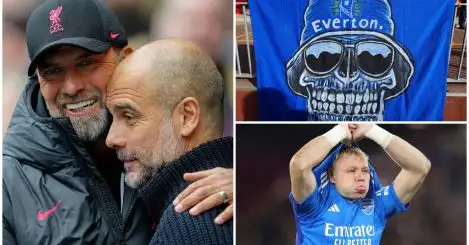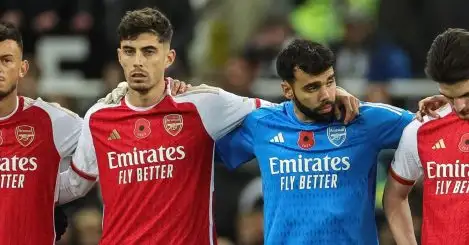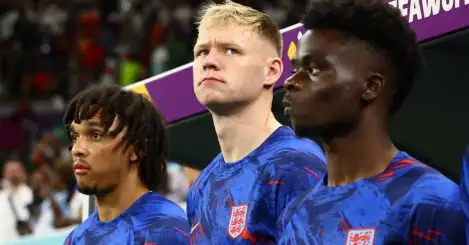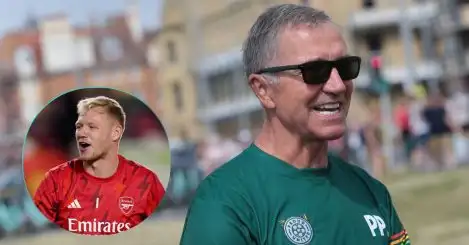Mikel Arteta is playing silly beggars at Arsenal; he knows goalkeepers need a hierarchy
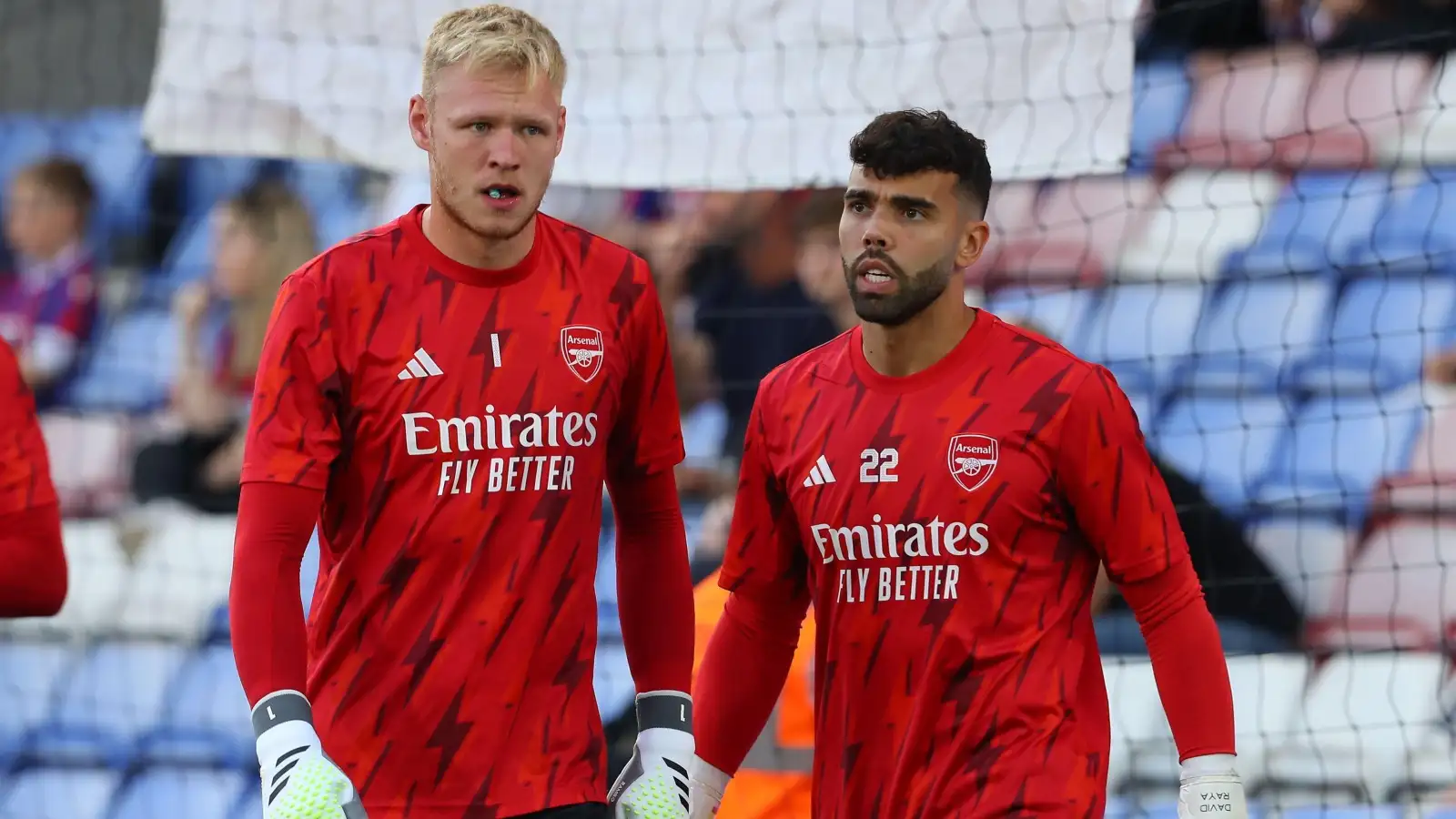
Mikel Arteta did Aaron Ramsdale a favour by floating his goalkeeper substitution theory – but implementing it would certainly not. The Arsenal boss can’t ignore why keepers are different…
Mikel Arteta has boiled plenty of p*ss since Sunday when he floated the idea of tactical substitutions involving his goalkeepers. Has the Arsenal manager stumbled upon something or, as plenty have suggested, is he just trying to make himself look clever?
Let’s hear him out…
🗣️ “I’m a really young manager and I have few regrets for what I’ve done, one of them, in two occasions I felt after 60 minutes to 85 minutes to change the keeper in that moment.”
Mikel Arteta reveals he wished he had the courage to make goalkeeper substitutions during matches pic.twitter.com/wHB7R1wkMl
— Football Daily (@footballdaily) September 18, 2023
It is not easy to pin-point – with any tangible evidence – the flaws in Arteta’s cold, hard logic. And yet it is so difficult to get on board with his cunning keeper plan. It just feels wrong. It is wrong.
Granted, many coaching innovations don’t initially sit right with the wider public. When Pep Guardiola ruthlessly bombed Joe Hart, England’s No.1 stopper, because he didn’t double up as a playmaker, many thought the newly appointed Manchester City boss had his priorities all wrong. Guardiola wasn’t helped by his first choice as keeper quarter-back, Claudio Bravo, being the first hologram to play in the Premier League. But then he signed Ederson. And now every coach wants an Ederson.
Prior to Pep, there was already an increased focus on goalkeepers and their ball-playing ability but it has certainly heightened in recent seasons to a tipping point. Perhaps in part because for pundits and analysts – the vast majority wilfully ignorant of the art of goalkeeping – that’s all they can properly scrutinise. But even at the highest level, the primary function of a goalkeeper remains what it always has been.
Does that mean that, in two or three seasons, we will see keepers being routinely swapped mid-match? Not likely. Because while the brief might have changed for goalkeepers, the mindset absolutely has not.
Arteta queried why he can routinely swap defenders or attackers even though he absolutely knows that keepers are different. No matter how much we tease them into evolving into outfield players, even though many are now just as technically capable as their team-mates, the physical and psychological demands of their job will always separate them from the pack.
You don’t have to be mad to be a goalkeeper and, these days, it doesn’t much help either. For the most part, playing the most reactive role in football, keepers need to be the calmest, most rational thinkers on the pitch. They might not always be involved – they can go entire games with nothing notable to do – but never must they allow themselves to drift off.
That requires a particular type of preparation not conducive to being rushed from the substitutes’ bench. There is a reason why goalkeepers are the first out to warm up on a matchday and why they work hard in that half-hour to get their mind and body right for 90 usually-thankless minutes.
That spotlight demands a confidence bordering on arrogance. Humility is more prevalent in the modern-day keeper, but today’s stoppers still need a mind free of doubt. When that creeps in, decision-making becomes clouded, mistakes occur and, sure as sh*t, criticism comes in a barrage.
Competition is healthy but so too is a hierarchy. Goalkeepers need to be pushed and aware of the consequences if their performance levels and drive wane. But to retain the clarity of thought and confidence required at elite level, they need to be clear where they stand in the manager’s mind.
Perhaps Arteta floating his theory on Sunday was a ploy to avoid scrutiny over his selection and the preference for David Raya over Aaron Ramsdale. It almost certainly was – and it worked. However the Arsenal boss dressed it, Ramsdale was dropped. “I cannot have two players in this position and not play them,” said Arteta, wilfully ignoring the fact that he can and he must. Any manager can fudge the issue, but when the big games come around, Ramsdale and Raya would know the pecking order when the team-sheet goes up.
Ramsdale and Raya are not that different. Few goalkeepers are – not really. You can scratch the surface and find varying strengths and weaknesses but now more than ever, especially at the very highest level, keepers have to be strong all-rounders, competent across the board, and able to do it all, whether it is starting attacks or stopping the opposition’s.
It would be fascinating to know in which games Arteta wanted to change his keepers, and why. Whatever the reason, he would have to explain his thinking to the man he is deeming unfit for purpose. Let’s play it out: say the manager wanted to replace Ramsdale with Raya on 60 minutes because the pattern of the game led Arteta to expect the opposition to pump crosses into the box. Raya comes for more (only Emi Martinez stopped a higher percentage of crosses last season, despite the Spaniard being one of the league’s smaller stoppers) so on he goes.
What about the next game? Now crosses become an issue for Ramsdale. And the opposition have sussed it too. So they can play on the supposed weakness Arteta himself has exposed. That hardly feeds into the persona Ramsdale likes to portray. It’s hard to be, or even play at being, the big man when all the time you’re wondering if your number is coming up.
Rather than juggling keepers and their egos, there are simpler answers: find a well-rounded No.1. Or work with the one you have to iron out those flaws.
Manchester United had David De Gea in their net for 12 years, in which time, the Spaniard never got to grips with the areas of his game that required improvement. De Gea became outdated, which is on both him and United.
Remember when they tried rotating between De Gea and Dean Henderson? It didn’t work. It never does – not over a sustained period.
We shouldn’t scoff at Arteta for thinking beyond convention and sharing a different idea. That, though, doesn’t mean it is a good one – which we suspect he knows. Being tempted to change a keeper on two occasions in almost four years suggests it would be a rare occurrence indeed, and one that would not disturb the natural hierarchy among his stoppers.
Arteta may want us to believe that there isn’t a hierarchy – but there absolutely is. For goalkeepers, that’s a necessity.
Read more: Prem keepers ranked: Ramsdale only kept off the bottom by fellow England man

